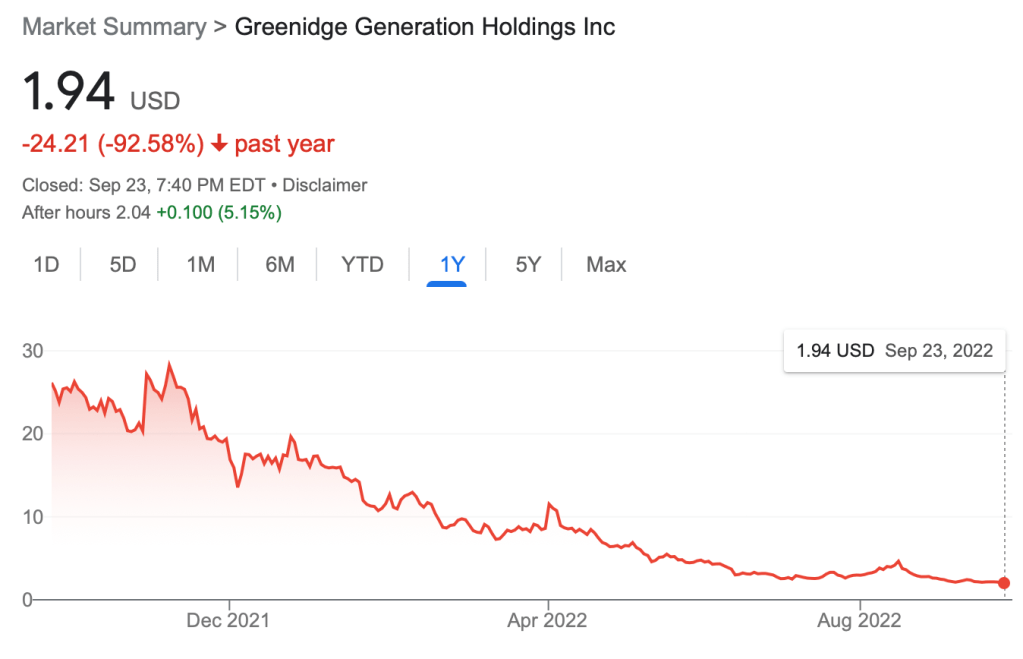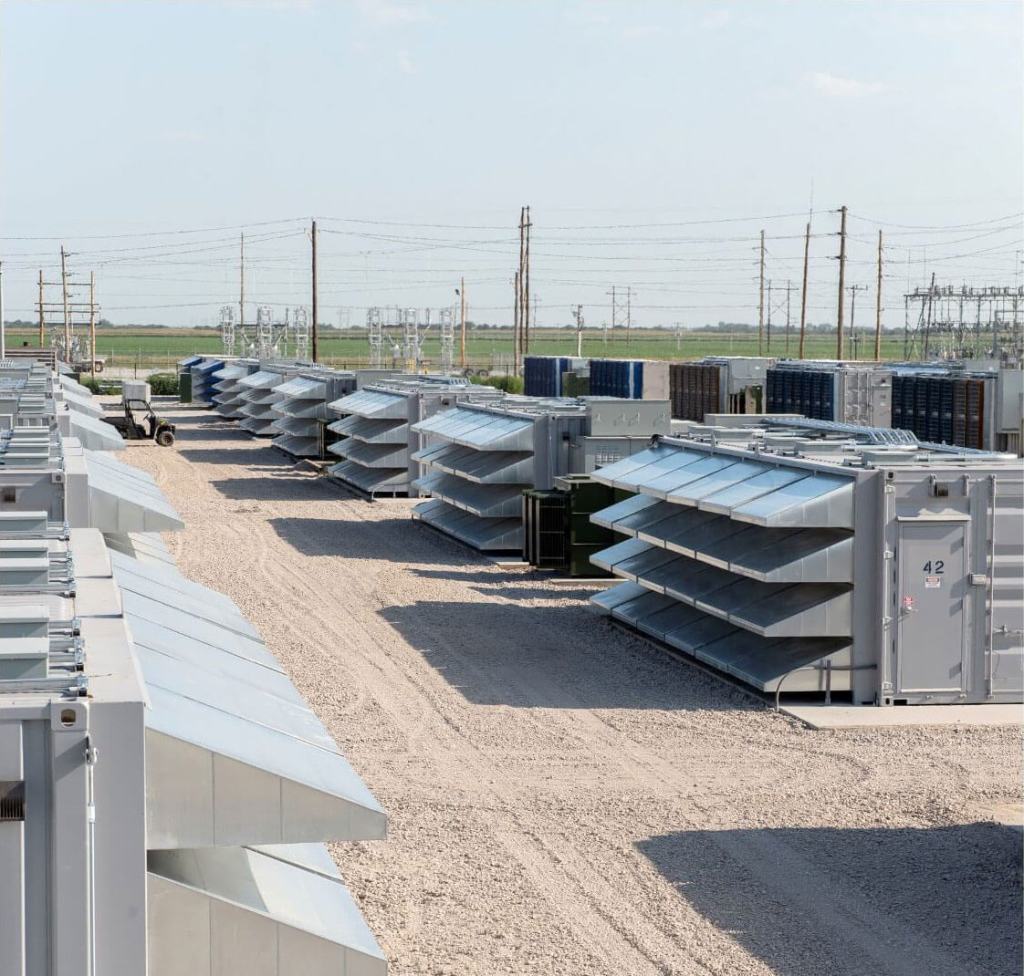DRESDEN, Sept. 24, 2022 — Shares of Greenidge Generation Holdings Inc. closed below $2 for the first time Friday, as the debt-laden company mired in environmental controversies faces a potential liquidity crisis.

The falling market price of Bitcoin — its primary source of revenue — and the elevated price of natural gas used to fuel its power plant in Dresden are straining the company’s ability to meet debt payment obligations, according to recent securities filings.
Greenidge sounded the following alarms to shareholders last month in its quarterly report (10Q) to the U.S. Securities and Exchange Commission:

“While the Company believes it will be successful in its efforts to implement the options to improve liquidity, which will allow it to meet its financial commitments for at least the next twelve months, there can be no assurance that these efforts will be successful…
“Because there is a risk as to our ability to continue as a going concern for a reasonable period of time, an investment in our common stock is highly speculative. Holders of our common stock could suffer a total loss of their investment.”

On the day of that SEC filing — Aug. 15 — Greenidge’s common stock (NASDAQ:ticker symbol GREE) closed at $4.65. It has been drifting lower even since, dipping to $1.87 Friday before finishing at $1.94. In light after-hours trading this morning it has bounced back above $2. So far this year, the stock has fallen 92 percent.
The company noted in its 10Q filing that the price of Bitcoin had fallen 57 percent in the second quarter (April 1- June 30), while the price of natural gas rose 53 percent.

Bitcoin hasn’t recovered. It traded around $19,000 early this morning, down slightly from $19,608 on June 30.
Greenidge derives most of its revenue by earning Bitcoin through “proof-of-work” mining operations in which special purpose computers race other miners to solve complex problems. It has borrowed heavily to purchase the tens of thousands of advanced computing “rigs” needed to compete in that energy-dependent business.
The power plant that drives (and cools) those mining rigs is fueled by natural gas. Recent increases in the price of that commodity have eaten into Greenidge’s profit margins.
Other Bitcoin miners are also suffering from the same combination of high energy costs and sagging Bitcoin prices.

On Thursday, Compute North Holdings Inc., a cryptocurrency mining company in the Midwest filed for bankruptcy protection, after succumbing a to liquidity crisis, as reported by The Wall Street Journal and Bloomberg.
And shares of TeraWulf (NASDAQ: WULF), which mines Bitcoin at its facility on the southern shore of Lake Ontario near Sommerset, have fallen more than 90 percent this year and 20 percent in the past month.
Greenidge’s financial challenges have largely escaped notice amid extensive news reporting on its environmental controversies.
In June, the state Department of Environmental Conservation denied the company’s bid to renew its state air emissions permit — which expired in September 2021 — on the grounds that the plant’s operations violate the state’s 2019 Climate Act. The company disagrees and has appealed within the DEC, a process that Greenidge says could take years.
Meanwhile, the company has never satisfied a key condition of its 2017 state water permit, which expires Sept. 30. That date is the deadline for it to install federally required fish screens on its water intake pipe in Seneca Lake. The company is not in a position to comply in time.
One former senior Environmental Protection Agency official, Judith Enck, has called for the Dresden plant to be closed down due to regulatory non-compliance. The Sierra Club and the law group Earthjustice recently issued a report on the negative effects of proof-of-work crypto-mining on the climate, local communities and public health.

The DEC has allowed Greenidge to continue and expand its Bitcoin mining operations in spite of the permit issues.
The company has said it is continuing to replace older mining machines with the latest models, strengthening its technical ability to compete against other Bitcoin miners. It reported earning 301 Bitcoins in August, up from 287 in July and 621 in the three-month quarter that ended June 30.
While contending with the air and water permit controversies, Greenidge has been scrambling to improve its financial liquidity.
Beginning in late 2020, the company began borrowing heavily at relatively high interest rates to finance the purchase of the latest mining rigs in what has been an arms race with other miners.
A series of loans taken out between December 2020 and last October totaled more than $30 million and carry interest rates of 15-17 percent, according to the 10Q. The company also raised $72.2 million from a pair of bond issues in late 2021 that carry interest rates of 8.5 percent. Substantial balances remain on almost all of them.

In March, Greenidge entered an equipment loan agreement with NYDIG ABL for up to $81 million at 13 percent interest. Days earlier, another loan of $26.5 million from a unit of B. Riley Financial carried a rate of 6 percent and was originally due July 20. On Aug. 10, that note’s due date was pushed back to June 2023, according to the 10Q.
“Given current industry and economic conditions,” the company explained in its filing, “our cash flow may not be sufficient to allow us to pay principal and interest on our debt and meet our other obligations.”
On Sept. 19, Greenidge announced an offer to sell up to $22.8 million of its common stock through another B. Riley unit and and one other underwriter. In a separate SEC filing describing that “shelf offering,” Greenidge warned that current investors “may experience dilution” of their share of earnings as new shares are added, potentially depressing the stock price. GREE shares have dipped 10 percent since Sept. 19.
In the SEC filing that describes the stock offering, Greenidge acknowledged “potential conflicts of interest” because B. Riley Securities would earn commissions on deal proceeds that are intended to pay down B. Riley Principal Capital debt. The filing also acknowledged that affiliates of B. Riley “may also communicate independent investment recommendations, market color or trading ideas … ” involving Greenidge shares.

In fact, an equity analyst and managing director at B. Riley Securities has been Wall Street’s most enthusiastic touter of Greenidge’s common stock.
Lucas Pipes, the analyst, started covering GREE shares last September. He issued a “buy” recommendation several days after B. Riley Principal Capital entered an agreement to sell up to $500 million in shares of Greenidge common stock.
When the stock was trading in the $25 range that month, Pipes told clients his price target for the stock was $78. A month later (last October) when the stock had dipped to $20, Pipes raised his price target to $82. In January, he lowered his target to $45.
By April 25, the stock had fallen to $6.40. The next day, Pipes lowered his target price to $42, while maintaining his “buy” recommendation to clients.
On June 23, after the shares had fallen close to $3, Pipes lowered his target to $10, while maintaining his “buy” recommendation.
Pipes has also touted Terawulf shares. In late March, when WULF shares were trading in the $9 range, he announced a target price of $24. WULF closed at $1.11 Friday.

Pipes did not return a phone message or respond to questions emailed Friday afternoon.
Although common shares of Greenidge Generation Holdings are publicly traded on the NASDAQ market, the company’s controlling shareholder is Atlas Holdings LLC, a Connecticut-based private equity company.
According to Greenidge’s Sept. 15 SEC filing, Atlas affiliates control about 90 percent of the voting power of the company’s capital stock. As a result, Greenidge Generation Holdings qualifies as “controlled company” that is exempt from certain NASDAQ corporate governance requirements.
Dale Irwin, president of Greenidge, did not respond to request for comment sent by email Friday afternoon.


great article Thank you for your reporting
LikeLike
Outstanding article, Peter. I never knew Greenidge was in such dire financial condition.
LikeLike
Bravo.
LikeLike